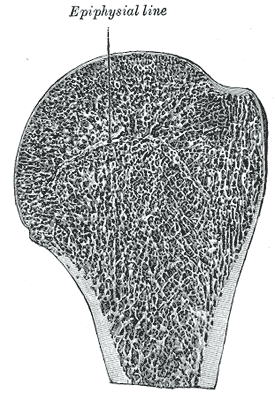Supracondylar process of the humerus
(Redirected from Supracondylar process)
Supracondylar Process of the Humerus
The Supracondylar Process of the Humerus is a bony spur or projection that is occasionally found on the humerus, the long bone in the upper arm. It is a rare anatomical variant that is present in approximately 1% of the population.
Anatomy[edit | edit source]
The supracondylar process is located on the anteromedial surface of the humerus, approximately 5 cm above the medial epicondyle. It is typically connected to the medial epicondyle by a thin band of fibrous tissue known as the ligament of Struthers, forming a canal through which the median nerve and brachial artery may pass.
Clinical Significance[edit | edit source]
Although the supracondylar process is usually asymptomatic, it can occasionally cause neurovascular compression syndrome, leading to symptoms such as pain, numbness, and weakness in the arm. This is known as Pronator Teres Syndrome or Struthers' Syndrome.
History[edit | edit source]
The supracondylar process was first described by the Scottish anatomist Sir John Struthers in 1848. He also described the associated ligament, which is now known as the ligament of Struthers.
See Also[edit | edit source]
References[edit | edit source]
Search WikiMD
Ad.Tired of being Overweight? Try W8MD's NYC physician weight loss.
Semaglutide (Ozempic / Wegovy and Tirzepatide (Mounjaro / Zepbound) available. Call 718 946 5500.
Advertise on WikiMD
|
WikiMD's Wellness Encyclopedia |
| Let Food Be Thy Medicine Medicine Thy Food - Hippocrates |
Translate this page: - East Asian
中文,
日本,
한국어,
South Asian
हिन्दी,
தமிழ்,
తెలుగు,
Urdu,
ಕನ್ನಡ,
Southeast Asian
Indonesian,
Vietnamese,
Thai,
မြန်မာဘာသာ,
বাংলা
European
español,
Deutsch,
français,
Greek,
português do Brasil,
polski,
română,
русский,
Nederlands,
norsk,
svenska,
suomi,
Italian
Middle Eastern & African
عربى,
Turkish,
Persian,
Hebrew,
Afrikaans,
isiZulu,
Kiswahili,
Other
Bulgarian,
Hungarian,
Czech,
Swedish,
മലയാളം,
मराठी,
ਪੰਜਾਬੀ,
ગુજરાતી,
Portuguese,
Ukrainian
Medical Disclaimer: WikiMD is not a substitute for professional medical advice. The information on WikiMD is provided as an information resource only, may be incorrect, outdated or misleading, and is not to be used or relied on for any diagnostic or treatment purposes. Please consult your health care provider before making any healthcare decisions or for guidance about a specific medical condition. WikiMD expressly disclaims responsibility, and shall have no liability, for any damages, loss, injury, or liability whatsoever suffered as a result of your reliance on the information contained in this site. By visiting this site you agree to the foregoing terms and conditions, which may from time to time be changed or supplemented by WikiMD. If you do not agree to the foregoing terms and conditions, you should not enter or use this site. See full disclaimer.
Credits:Most images are courtesy of Wikimedia commons, and templates, categories Wikipedia, licensed under CC BY SA or similar.
Contributors: Prab R. Tumpati, MD

